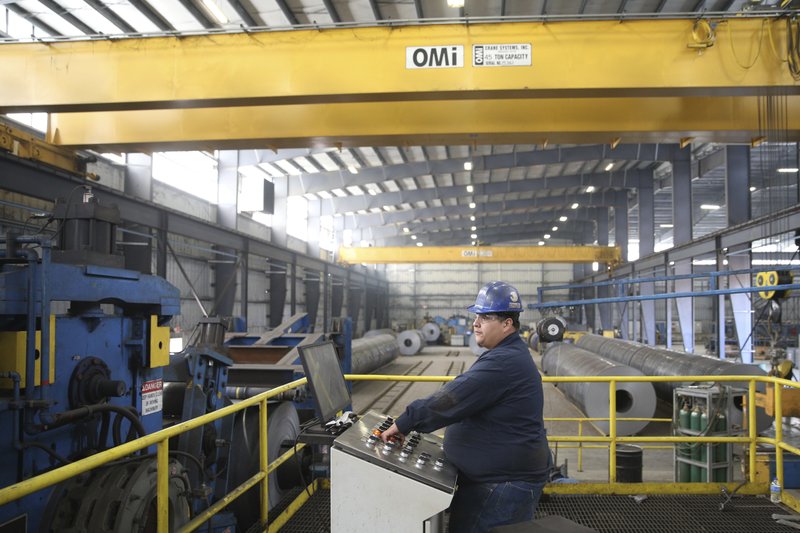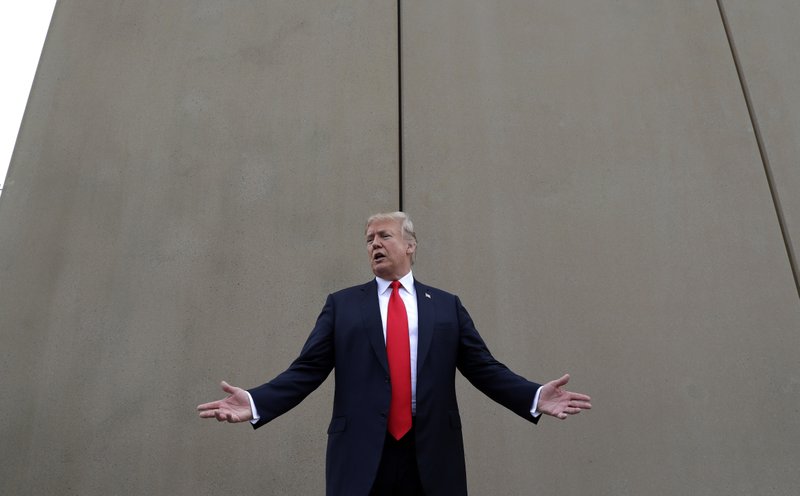Aimed at China, Donald Trump’s tariffs are hitting closer to home

President Donald Trump’s escalating dispute with China over trade and technology is threatening jobs and profits in working-class communities where his “America First” agenda hit home. The Commerce Department has received more than 2,400 applications from companies seeking waivers from the administration’s tariffs on steel and aluminum imports, which may result in duty payments of millions of dollars for larger businesses. The department has begun posting the requests online for public comment; several of the applications released so far suggest deep misgivings with Trump’s protectionist strategy, especially in areas where he won strong support during the 2016 election. The tariffs are aimed primarily at China for flooding the global market with cheap steel and aluminum. But they’ve also led to confusion and uncertainty, according to Associated Press interviews and a review of records. In Oklahoma, Texas and Wisconsin, for example, businesses operating in the furniture, energy and food sectors have outlined the financial difficulties they’d face if they’re not excused from the steel tariff. In Okmulgee, Oklahoma, dozens of jobs hang in the balance as office furniture giant Steelcase waits to hear back from the Commerce Department. A Steelcase subsidiary, PolyVision, operates a plant in Okmulgee that uses a special type of steel from Japan to manufacture a durable glass-like surface for whiteboards and architectural purposes. PolyVision “cannot and will not be able to procure” from U.S. companies the cold-rolled steel it requires “in a sufficient and reasonably available amount or of a satisfactory quality,” Steelcase said. Trump won most of the votes cast for president in Okmulgee County. Without a waiver, Steelcase warned, the “economic viability of PolyVision (and) the small town of Okmulgee” would be jeopardized. The waiver request also indicates that a $15 million plant expansion may be at risk. Steelcase and PolyVision are on the verge of making the investment, which would create new construction and manufacturing jobs, according to the request. Roger Ballenger, Okmulgee’s city manager, said he and other local officials are “very concerned about the situation with PolyVision.” The tariffs — 25 percent on imported steel and 10 percent on imported aluminum — are designed to protect and rebuild the U.S. companies that manufacture the metals. The U.S. temporarily exempted several major trading partners, including the European Union, Mexico and Canada. China, which was left on the target list, retaliated by imposing tariffs on $3 billion in U.S. products, including apples, pork and ginseng. Trump responded by adding more protectionist measures as punishment for Chinese theft of U.S. intellectual property. And Beijing punched back by proposing tariffs on $50 billion in U.S. products including small aircraft and soybeans — a direct threat to rural areas that were key to Trump’s victory. John Hritz, CEO of JSW Steel USA in Baytown, Texas, said his company is in lockstep with Trump’s approach. “We’re in favor of growing the steel industry in this country,” Hritz said. JSW Steel, owned by Indian conglomerate JSW Group, is embarking on a $500 million overhaul of the plant that it says will create hundreds of jobs. The growth would be welcomed in Baytown, where unemployment is 9.8 percent, more than double the national rate. Baytown is located partly in Harris County, which Democrat Hillary Clinton won, and partly in Chambers County, which Trump handily won. The future is much murkier for another Baytown steel business, Borusan Mannesmann Pipe. Without a waiver, Borusan may face tariffs of $25 million to $30 million annually if it imports steel tubing and casing from its parent company in Turkey, according to information the company provided to the AP. Borusan said the Baytown production line would no longer be competitive and “jobs would be threatened” if it cannot import 135,000 metric tons of steel annually over the next two years. The pipes Borusan produces are used primarily as casing for oil and natural gas wells. But if Commerce says yes, Borusan will be able to unlock a $25 million investment in the Baytown facility as it seeks to become a “100 percent domestic supplier,” according to the waiver request. An additional $50 million expansion in pipe fabrication capacity would follow, the company said, leading to as many as 170 new jobs. Seneca Foods Corporation, the nation’s largest vegetable canner, said in its waiver application that it’s unclear, at best, if U.S. suppliers have the ability or willingness to expand their production in the long term to meet the company’s annual demand for tinplated steel. But “clearly they cannot meet demand in the short term,” Seneca told Commerce officials. That means Seneca has to buy a portion of what it needs from overseas. A person with knowledge of Seneca’s situation said the company would face a $2.25 million duty if the Commerce Department doesn’t approve its waiver request for 11,000 metric tons of tinplate it already agreed to purchase from China. The material is to be delivered this year and next, according to the waiver request. The person was not authorized to speak publicly and spoke to the AP on condition of anonymity. Seneca said it employs more than 400 people at can-making facilities in Wisconsin and Idaho and near its headquarters in New York’s Wayne County, where Trump bested Clinton. The company doesn’t warn layoffs are imminent if the waiver isn’t approved. Instead, the tariffs would likely come out of Seneca’s bottom line, the person said. Republished with the permission of the Associated Press.
Donald Trump hails border wall start, but it’s not quite true

President Donald Trump hailed the start of his long-sought southern border wall this past week, proudly tweeting photos of the “WALL!” Actually, no new work got underway. The photos showed the continuation of an old project to replace two miles of existing barrier. And on Saturday, he ripped Amazon with a shaky claim that its contract with the post office is a “scam.” Trump and his officials departed from reality on a variety of subjects in recent days: the census, Amazon’s practices and the makeup of the Supreme Court among them. Here’s a look at some statements and their veracity: TRUMP: “Great briefing this afternoon on the start of our Southern Border WALL!” — tweet Wednesday, showing photos of workers building a fence. TRUMP: “We’re going to be starting work, literally, on Monday, on not only some new wall — not enough, but we’re working that very quickly — but also fixing existing walls and existing acceptable fences.” — Trump, speaking the previous week after signing a bill financing the government. THE FACTS: Trump’s wrong. No new work began on Monday or any other time this past week. And the photos Trump tweeted were misleading. They showed work that’s been going on for more than a month on a small border wall replacement project in Calexico, California, that has nothing to do with the federal budget he signed into law last week. The Calexico project that began Feb. 21 to replace a little more than 2 miles (3.2 kilometers) of border wall was financed during the 2017 budget year. A barrier built in the 1990s mainly from recycled metal scraps is being torn down and replaced with bollard-style barriers that are 30 feet (9.1 meters) high. Ronald D. Vitiello, acting deputy commissioner of U.S. Customs and Border Protection, defended the president’s statements, saying Friday “there’s construction” underway. TRUMP: “If the P.O. ‘increased its parcel rates, Amazon’s shipping costs would rise by $2.6 Billion.’ This Post Office scam must stop. Amazon must pay real costs (and taxes) now!” — tweet Saturday. TRUMP: “I have stated my concerns with Amazon long before the Election. Unlike others, they pay little or no taxes to state & local governments, use our Postal System as their Delivery Boy (causing tremendous loss to the U.S.), and are putting many thousands of retailers out of business!” — tweet Thursday. THE FACTS: Trump is misrepresenting Amazon’s record on taxes, the U.S. Postal Service’s financial situation and the contract that has the post office deliver some Amazon orders. Federal regulators have found that contract to be profitable for the Postal Service. People who buy products sold by Amazon pay sales tax in all states that have a sales tax. Not all third-party vendors using Amazon collect it, however. As for the post office, package delivery has been a bright spot for a service that’s lost money for 11 straight years. The losses are mostly due to pension and health care costs — not the business deal for the Postal Service to deliver packages for Amazon. Boosted by e-commerce, the Postal Service has enjoyed double-digit increases in revenue from delivering packages, but that hasn’t been enough to offset declines in first-class letters and marketing mail, which together make up more than two-thirds of postal revenue. While the Postal Service’s losses can’t be attributed to its package business, Trump’s claim that it could get more bang for its buck may not be entirely far-fetched. A 2017 analysis by Citigroup concluded that the Postal Service was charging below-market rates as a whole for parcels. The post office does not use taxpayer money for its operations. Trump is upset about Amazon because its owner, Jeff Bezos, owns The Washington Post, one of the targets of his “fake news” tweets. TRUMP: “Because of the $700 & $716 Billion Dollars gotten to rebuild our Military, many jobs are created and our Military is again rich. Building a great Border Wall, with drugs (poison) and enemy combatants pouring into our Country, is all about National Defense. Build WALL through M!” — tweets Sunday and Monday. THE FACTS: Trump is floating the idea of using “M″ — the Pentagon’s military budget — to pay for his wall with Mexico. Such a move would almost certainly require approval from Congress and there’s plenty of reason to be skeptical about the notion of diverting military money for this purpose. Only Congress has the power under the Constitution to determine federal appropriations, leaving the Trump administration little authority to shift money without lawmakers’ approval. Pentagon spokesman Chris Sherwood referred all questions on the wall to the White House. Spokeswoman Sarah Huckabee Sanders declined to reveal specifics, but said Trump would work with the White House counsel to make sure any action taken was within his executive authority. DAVID SHULKIN, citing reasons Trump fired him as veterans affairs secretary: “I have been falsely accused of things by people who wanted me out of the way. But despite these politically based attacks on me and my family’s character, I am proud of my record and know that I acted with the utmost integrity.” — op-ed Thursday in The New York Times. THE FACTS: His statement that he and his family were subjected to politically based attacks is disingenuous, though politics contributed to his dismissal. White House support for Shulkin eroded after a blistering report in February by VA’s internal watchdog, a non-partisan office. The inspector general’s office concluded that he had violated ethics rules by accepting free Wimbledon tennis tickets. The inspector general also said Shulkin’s chief of staff had doctored emails to justify bringing the secretary’s wife to Europe with him at taxpayer expense. It is true, though, that Shulkin had encountered resistance from about a half-dozen political appointees at the VA and White House who rebelled against him. In an extraordinary telephone call, John Ullyot, a top communications aide, and VA spokesman Curt Cashour asked the Republican staff director of the House Veterans Affairs Committee to push for Shulkin’s


